|
|
|
Sort Order |
|
|
|
Items / Page
|
|
|
|
|
|
|
| Srl | Item |
| 1 |
ID:
170417
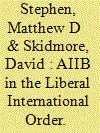

|
|
|
|
|
| Summary/Abstract |
The rise of China raises fundamental questions about the future of the liberal international order (LIO) at a time when it is under ever more strain. Although China’s focus for some years was on joining and participating in existing multilateral institutions, today China is increasingly building its own. Prominent among them is the Asian Infrastructure Investment Bank (AIIB), launched in late 2014. Against the background of contending theoretical expectations, this article examines the extent to which the AIIB either reinforces or challenges the LIO and highlights what this tells us about China’s broader relationship with the LIO. We provide a definition of the LIO that is based on its social purpose rather than on its formal characteristics. State-centric approaches offer insights into China’s decision to engage in new institution building via the AIIB, but we argue that a focus on social purpose is necessary to assess the AIIB’s broader implications for the LIO. We find that, while conforming in large measure to existing institutional models, the AIIB promotes China’s integration into global social networks, strengthens state-led development pathways, and is associated with the Chinese norm of non-interference. The AIIB, thus, foreshadows the possibility of an institutionalised international order indifferent to liberalism. In sum, the AIIB reflects the tensions between the socialising effects of the LIO and China’s growing externalisation of its own non-liberal, state-led model of political economy.
|
|
|
|
|
|
|
|
|
|
|
|
|
|
|
|
| 2 |
ID:
141374
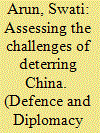

|
|
|
| 3 |
ID:
152186
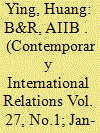

|
|
|
|
|
| Summary/Abstract |
Implementation of China’s Silk Road Economic Belt and 21st-Century Maritime Silk Road (B&R) initiative and the advent of Asian Infrastructure Investment Bank (AIIB) have redirected attention to infrastructure building in economic development. The domestically driven B&R policy is rewriting the geoeconomic and geopolitical map of Eurasia, while AIIB catalyzes a positive change in the dynamics of international development cooperation. They provide opportunities for South Asia which has economic potential but limited foreign investment inflow thus far.
|
|
|
|
|
|
|
|
|
|
|
|
|
|
|
|
| 4 |
ID:
149630
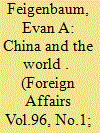

|
|
|
|
|
| Summary/Abstract |
In 2013, China launched [2] an initiative to establish a new multilateral development institution, the Asian Infrastructure Investment Bank [3]. The AIIB, Beijing argued, could help fill a multitrillion-dollar gap in financing for railways, roads, power plants, and other infrastructure in the world’s fastest-growing region. But the United States treated China’s proposal as a challenge to the existing regional and global development institutions that it had helped establish in the decades after World War II [4]. Washington not only refused to join the bank itself but also launched a quiet diplomatic campaign to dissuade its allies from doing so either.
|
|
|
|
|
|
|
|
|
|
|
|
|
|
|
|
| 5 |
ID:
144908
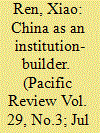

|
|
|
|
|
| Summary/Abstract |
As China is entering into the center stage of the world arena, it has become more proactive in regional and global institution-building. Globally, it has been actively involved in the G20 affairs and will be hosting the 2016 G20 Summit in Hangzhou. Regionally, it came up with a major initiative for a new institution, namely, the Asian Infrastructure Investment Bank (AIIB). This article aims to analyze the new institution's formation, goals and institutional arrangements as well as its implications.
|
|
|
|
|
|
|
|
|
|
|
|
|
|
|
|
| 6 |
ID:
192167
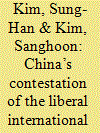

|
|
|
|
|
| Summary/Abstract |
The concept of ‘revisionism’ has caught the attention of international relations scholars amid intensifying rivalry between the United States and China. It is a trademark of rising powers, and China was likewise expected to become a revisionist power, intent on changing the status quo. However, history tells us that not all rising powers necessarily become revolutionary states, seeking to overturn the prevailing order and replace it with another through hegemonic wars. This paper presents a novel understanding of revisionism by distinguishing between strategic ‘contestation’ and ‘challenge’. In the context of declining unipolarity, a dissatisfied rising power will contest the rules and principles of issue-specific regimes and demand legitimate adjustments that better reflect the new distribution of power. A challenge emerges when demands are rejected, and a contestation leads to ‘deconcentration’ and ‘delegitimation’ of the established order. The establishment of the AIIB can be examined as an example of contested multilateralism that falls short of a challenge. This paper concludes that China is ‘contesting’, not ‘challenging’ the liberal international order and suggests a set of countermeasures that the U.S. can think of: selective accommodation, reinforcement of alliances and partnerships, and overcoming domestic challenges such as populism that undermine the liberal values, constitutive of the liberal international order.
|
|
|
|
|
|
|
|
|
|
|
|
|
|
|
|
| 7 |
ID:
154727
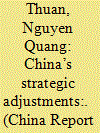

|
|
|
|
|
| Summary/Abstract |
After the eighteenth Congress of the Chinese Communist Party, China adjusted its diplomatic strategy and
transformed its pattern of economic development. This has had and will continue to have both a positive
and a negative impact on the international financial institutions and the regional and global economy.
The ‘One Belt, One Road’ (OBOR) strategy, combined with the Asian Infrastructure Investment Bank
(AIIB) and the internationalisation of the yuan, is the main focus, and exerts a strong impact on the
existing international financial institutions as well as the economic relations between China and many
other countries in the world. It has attracted many developed and developing countries to join the AIIB.
It also has made many emerging economies become closely linked to China. Moreover, it contributes to
the emergence of many ‘asymmetric’ pairs of economic relations between China and its neighbours. China
is now connected with Europe through an overland route as well as through the boosting of economic,
trade and investment ties between Asia and Europe. Furthermore, while Europe has been concerned
about China’s unfair competition and the dependence on Chinese investment, ASEAN has increasingly
deepened the mutual economic dependence between itself and Beijing. A negative outcome of this is the
rising economic dependence on China of quite a few ASEAN member states, including Vietnam.
|
|
|
|
|
|
|
|
|
|
|
|
|
|
|
|
| 8 |
ID:
157819
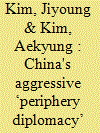

|
|
|
|
|
| Summary/Abstract |
In this special section, the present article reviews South Korean perspectives on China's ‘periphery diplomacy’ with a focus on Chinese behaviour with respect to the East China Sea maritime territory and the Asian Infrastructure Investment Bank (AIIB). By analysing research papers published by various Korean research institutions and academic journals, this article demonstrates that most Korean scholars hold that as long as China's growth goes on, the tensions between the US and China are likely to intensify. The article also shows that one of the primary concerns of South Korean scholars lies in the question of how South Korea should respond to changing regional orders and a rising China. The article argues that South Korea's strategic dilemma is reflected in a regional structure in which competition between two great powers has recently forced the periphery to impose bilateral ties on.
|
|
|
|
|
|
|
|
|
|
|
|
|
|
|
|
| 9 |
ID:
165152
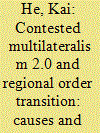

|
|
|
|
|
| Summary/Abstract |
This article proposes a new concept of ‘contested multilateralism 2.0’ to describe the puzzling institutional building efforts by non-ASEAN members after the 2008 global financial crisis (GFC) in the Asia-Pacific. It suggests that different to ‘multilateralism 1.0’ of the 1990s, which was mainly led by ASEAN, this wave of multilateralism has been initiated by other powers, such as the United States, China, Japan, Australia and South Korea, either by forming new institutions or by reinvigorating existing ones. This article advances an institutional balancing argument. It suggests that ‘contested multilateralism 2.0’ is a result of institutional balancing among major states under the conditions of high strategic uncertainty and high economic interdependence after the GFC. One unintended consequence may be that it could well lead to a more peaceful transformation of the regional order in the Asia-Pacific if regional security hotspots, such as the Korean crisis and the South China Sea dispute, can be managed appropriately.
|
|
|
|
|
|
|
|
|
|
|
|
|
|
|
|
| 10 |
ID:
168231
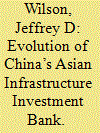

|
|
|
|
|
| Summary/Abstract |
China’s Asian Infrastructure Investment Bank (AIIB) is a controversial addition to both the global and Asian economic architectures. Western critics have alleged it is a vehicle designed to achieve China’s geostrategic goals, while scholars have argued it marks China’s adoption of a ‘revisionist’ foreign policy strategy. This article argues that such interpretations are incorrect, as they fail to account for the evolution of China’s AIIB agenda. To secure a broad membership and international legitimacy for the AIIB, China compromised with partners during governance negotiations in 2015. Western country demands saw several controversial initial proposals dropped, the governance practices of existing multilateral development banks were adopted, and cooperative partnerships were developed with the World Bank and Asian Development Bank. This transition from a revisionist to status-seeking AIIB agenda reveals the flexibility of Chinese economic statecraft, and its willingness to compromise strategic goals to boost the legitimacy of its international leadership claims.
|
|
|
|
|
|
|
|
|
|
|
|
|
|
|
|
| 11 |
ID:
165877
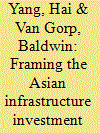

|
|
|
|
|
| Summary/Abstract |
This qualitative study is designed to identify the frames in the debate on the Asian Infrastructure Investment Bank (AIIB) and analyze the framing by different actors. To that end, it drew insights from framing theory and conducted an in-depth inductive frame analysis based on a representative sample of official documents and news articles. 14 frames (7 frames and 7 counterframes) emerged therefrom. They represent the AIIB debate along six dimensions: China vis-à-vis AIIB (Tool, We’re all equal), AIIB for members (Boon, Bane), AIIB versus status quo (Rival, Complement, Winds of change), standards (Made in China, Qualified yes, Up to par), prospects (Off to a good start, Not all roses), and external reactions (Game, Much ado about nothing). Building on the frames identified, the study went further to show how political actors applied frames in their (self-)justificatory discourse, and how media enriched the debate by bringing in frames absent from the official discussions in the political circle. The findings herein not only attest to the contested nature of the AIIB and the diverging framing by different actors, but shed some light on the wider discussions on China’s evolving relations with the incumbent global system and established powers.
|
|
|
|
|
|
|
|
|
|
|
|
|
|
|
|
| 12 |
ID:
191910
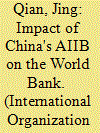

|
|
|
|
|
| Summary/Abstract |
The World Bank, under the stewardship of the United States, stands out as the global leader among international development organizations. Does China's establishment of the Asian Infrastructure Investment Bank (AIIB) undermine this status? Examining this question, we focus on the borrowing practices of a special set of countries: the founding members of the AIIB. These founders openly defied the public preference of the United States, arguably to create a potential rival to the World Bank. Using a new causal inference method, Pang, Liu, and Xu's Dynamic Multilevel Latent Factor Model—as well as several well-known estimation models as robustness checks—we document at least a temporary decrease in the number of World Bank infrastructure projects that the developing AIIB founders have entered into. This study presents the first systematic evidence that China's AIIB could unsettle the political influence the United States has enjoyed over developing countries through its leadership of the World Bank. An important set of countries may be parting ways with the World Bank and looking to a Chinese institution for leadership in the world of development.
|
|
|
|
|
|
|
|
|
|
|
|
|
|
|
|
| 13 |
ID:
171972
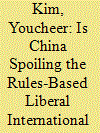

|
|
|
|
|
| Summary/Abstract |
Driven by structural theories of international relations, some scholars have described China as either spoiling or shirking the rules-based liberal international order (RBLIO). The convergence of the relative US decline since the Global Financial Crisis of 2008 and China’s assertive diplomacy has aggravated this anxiety. This paper examines the theoretical and empirical validity of this argument by utilizing competing theories of social constructivism and issue–path dependence. Specifically, this paper conducts a brief empirical analysis of China’s stances on four core issues of global governance, including (1) voting patterns in the United Nations General Assembly, (2) trade and the World Trade Organization (WTO), (3) South China Sea disputes and the Permanent Court of Arbitration (PCA), and (4) the Asian Infrastructure Investment Bank (AIIB). The results indicate that China has been passive toward the restructuring of legal norms, merely invoking them when a specific dispute arises. Concurrently, China occasionally pursues an alternative institutional platform if the functional concentration of a target institution is diffused and fragmented. In short, the empirical analysis demonstrates the salience of claims for China’s issue–path dependence. The paper concludes with theoretical and policy implications, concluding that as China holds no predetermined, concrete stance on all components of the rules-based liberal international order, disintegrating the country from it could be a fatal mistake.
|
|
|
|
|
|
|
|
|
|
|
|
|
|
|
|
| 14 |
ID:
160240
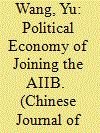

|
|
|
|
|
| Summary/Abstract |
This article analyzes the determinants of new prospective members of the Asian Infrastructure Investment Bank (AIIB). I argue that less democratic countries are more likely to apply, and that when deciding to join the institution countries learn from their neighbors and from any previous international organization (IO) interactions they have had with China. Building on detailed panel data covering the institution’s founding period, i.e. from October 24, 2014 to March 31, 2015, I fit both a probit model with time polynomials and a Cox duration model to identify country characteristics that correlate with joining the AIIB. I show that countries with lower polity scores or whose neighbors had already become members were more likely to join, and that the probability was higher for countries that belonged to China-led IOs. Lastly, I show that countries under-represented in the existing international financial system were also more likely to join. My findings highlight the importance of democracy in shaping the membership structure of the AIIB, and demonstrate how countries leverage information from their neighbors and from previous interactions with China to adjust the perceived risk of joining. They also provide the first modern-day empirical support for the contested multilateralism framework.
|
|
|
|
|
|
|
|
|
|
|
|
|
|
|
|
| 15 |
ID:
177642
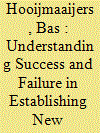

|
|
|
|
|
|
|
|